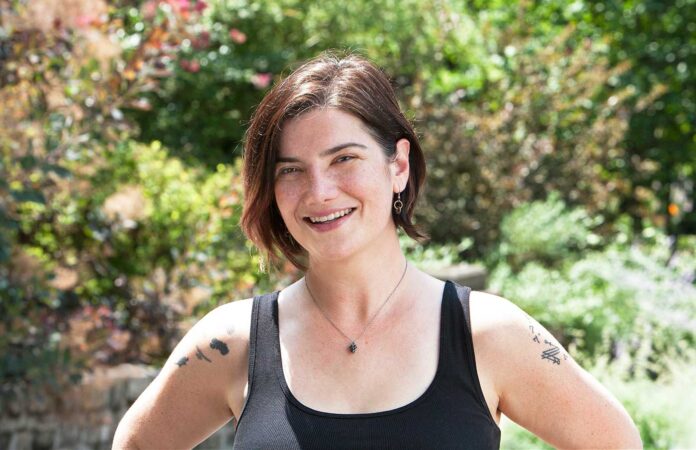Philadelphia-based poet, translator and essayist Darla Himeles awaits the release of her first full-length poetry collection, “Cleave,” in April. The collection centers on a series of lesbian love poems including Himeles’ journey to conceive a child in a same-sex marriage, and examines prior sexual abuse, domestic violence, political resistence and perseverence.
Several of the poems, including “Kiss Me,” are concerned with Himeles and her wife falling in love and getting married before same-sex marriage was legalized nationwide. Her wife, Betsy Reese, came out roughly 30 years ago, when disclosing one’s queerness was more dangerous in certain circumstances.
“She had to be more secretive about her queerness,” Himeles said. “She was in Lancaster, Pennsylvania where it just wasn’t safe for her to be out. When we got together, I [thought], I don’t want to only kiss behind closed doors with the light off, I want people to know we’re in love everywhere we go.”
Himeles and Reese got together in 2007, when marriage equality was a hot topic of discussion in the media. They got married in 2009 in Provincetown, Massachusetts, and had initially moved to Maine because the state recognized their marriage at the time. However, opponents of the same-sex marriage law introduced Question 1 in Maine’s November elections, asking residents if they wanted to reverse the law and “protect” marriage. Enough Maine residents voted in the affirmative, deeming same-sex marriage once again illegal in the state.
“I think that’s definitely a thread through the manuscript that’s political for me,” Himeles said. “It’s really important to me that not only that I can live out loud, but that these poems can reach other people who are struggling with being out, or embracing their queerness, or if they’re in a same-sex realtionship or they’re attracted to same-sex or same-gender humans, that they can feel seen by the poems. And also [feel] empowered on their own journey toward kissing in public.”
Himeles said that in writing many of the poems that deal with heavier subject matter, she had to revisit past traumas. She experienced sexual abuse when she was a teenager, which she describes in the poem “Breach.” Although she found it difficult to write about this experience that she wasn’t able to verbalize until her 30s, she found power in revisiting that time through her writing.
“I was able to have compassion for the kid I was, and for the time I was in and to look back on the experience with a kind of tenderness that allowed me to be more honest about it.”
In the poem, Himeles’ adult self is talking to her teenage self.
“It’s just a reminder that those parts of ourselves that are stuck in time in bad experiences or traumas that we black out about, there is something powerful in reaching back to those times,” she said. “That was a terrible experience, but wait until you see how we’re going to fall in love and have this beautiful life that we’re going to build with great intention and agency over our body.”
The words in the last stanza of the poem form the shape of a window, though readers have interpreted it as other forms, Himeles said.
“For me, it’s about pulling my younger part through the window of this dark room and dark time that she was in,” Himeles said. “When I see it on the page, it’s instantly a reminder of, rather than of the trauma itself, but the work that I’ve done to integrate those experiences into myself in a way that feels powerful and healing.”
The journey through conceiving a child in a same-sex relationship is another theme that prominently winds through “Cleave.” Although Reese is on their daughter’s birth certificate, it was recommended to the couple that she go through a second parent adoption.
“Even though she’s on the birth certificate, and we’re legally married, [Betsy’s] parenthood could still be potentially challenged in a court of law,” Himeles said. “Thank god [the Defense of Marriage Act] is gone, and thank goodness we’ve made so much progress in the last decade especially, but we’re still not there.”
In “Poem for Evelyn,” Himeles described some of the political unrest that was happening in 2017, shortly after Trump was elected, and the same year that the couple’s daughter, Evelyn, was born. Himeles recalls being at the Women’s March and other protests against immigrant deportation.
“It was weird to bring this child into that political moment,” she said. “Writing the poem was important to me because it helped me contextualize [Evelyn,] and our story, and that time and larger narratives. Like the queer love poems, it’s personal but it’s also political.”
Ultimately, Himeles hopes that people from all walks of life will read her poems — people who are queer, have experienced trauma, fallen in love or started a nontraditional family.
“It’s really important to me that ‘Cleave’ is not just read by people who think of themselves as poetry-lovers,” she said. “[The poems] are meant to be accessible and to create an emotional impression that hopefully will feel like recognition. There’s not one way to understand them. If you pull out an image or a line or a word that feels true to you, then you have gotten something that I was hoping you would get from the poem — a sense of being seen, or solidarity or being emotionally moved in some way.”
More information about Himeles’ work can be found at: https://www.darlahimelespoetry.com.
“Cleave” can be pre-ordered through Get Fresh Books.

